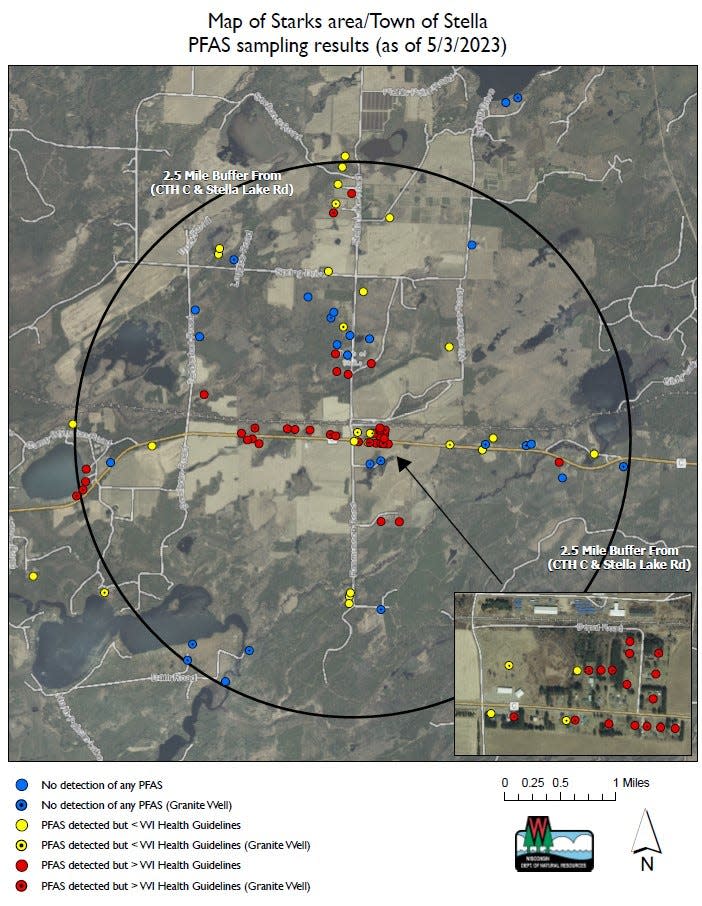Water wells at two summer camps near Rhinelander likely impacted by 'forever chemicals'
MADISON – The "forever chemical" contamination plaguing one northern community is also likely affecting the water at two nearby summer camps, Wisconsin Department of Natural Resources officials said Tuesday.
Camp Horseshoe and Camp Deerhorn, both summer camps for boys, are located just a short drive outside of the Oneida County Town of Stella, on Snowden Lake and Fourth Lake, respectively.
Camp Deerhorn had detections of PFOA and PFOS — two of the most common PFAS compounds— between 0.4 and 1 parts per trillion, while Camp Horseshoe had detections between 1.3 parts parts per trillion and 49.8 parts per trillion, according to department data.
The Environmental Protection Agency earlier this year recommended a federal standard of 4 parts per trillion for PFOA and PFOS in drinking water, so detections above that number could cause reason for concern, even if they are not yet enforceable standards. The enforceable state standard for Wisconsin is 70 parts per trillion, but the Department of Health Services has a recommendation of 20 parts per trillion.
In the meantime, DNR staffers said that while the agency is communicating with the camps, they can't force well shutdowns or any other actions.
"It's up to the facility, the actions they take," said Steve Elmore, the drinking and groundwater director for the agency, during a briefing on the Stella contamination.
"For these types of facilities, it's not a regulated contaminant, and therefore they can take actions they deem necessary.'

Elmore said the DNR is working on public notices with the camps so that users are aware of the contamination.
"But beyond that, it's up to the facility themselves on whether to shut down a well or not," he said.
Stella is a small town about 10 miles east of Rhinelander, and until about eight months ago, residents thought the water from their private wells was some of the best. But that perspective was rocked late last year, when random DNR testing of private wells found levels as high as 46,000 parts per trillion of PFAS in some of the wells.
Since December, the DNR has been working to test wells in the area, reaching out to nearly 120 residents about free testing, and has started to provide bottled water to residents who have high levels of the contaminants in their wells.
Testing and outreach is ongoing.
"We haven't concluded the whole extent of the contamination. We're still gathering information and continue to update our mapping and understanding of where contamination is in the area," Elmore said.
The agency has also collected samples from a nearby paper mill that may have provided sludge to spread on nearby farm fields as inexpensive fertilizer in the past. Those results have not yet come in from the lab, said Adrian Stocks, the water quality director for the DNR.
Permit requirements have also been put into effect for nearby water systems, such as Rhinelander and paper mills, to monitor the levels of PFAS in the water and sludge leaving their facilities.
The DNR is recommending that impacted homeowners drill a new, deeper well for drinking water, but acknowledge that that may not be the solution due to cross-contamination or other issues. Treatment systems also wouldn't be able to handle extremely high levels on their own.
"We may find that treatment is not an option on some of these wells," Elmore said. "Some of them, the PFAS may be so high that alternative water will have to be a long-term solution, whether that is bottled water, bulk water supplied in a tank or a water main to the home to supply it from a system outside of the area."
About PFAS
PFAS, or per- and polyfluoroalkyl substances, are a family of man-made chemicals used for their water- and stain-resistant qualities in products like clothing and carpet, nonstick cookware, packaging and firefighting foam.
The family includes 5,000 compounds, which are persistent, remaining both in the environment and human body over time. The chemicals have been linked to types of kidney and testicular cancers, lower birth weights, harm to immune and reproductive systems, altered hormone regulation and altered thyroid hormones.
The chemicals enter the human body largely through drinking water. PFAS have been found across Wisconsin.
Laura Schulte can be reached at leschulte@jrn.com and on Twitter at @SchulteLaura.
This article originally appeared on Milwaukee Journal Sentinel: PFAS likely affecting water at 2 summer camps near Rhinelander
